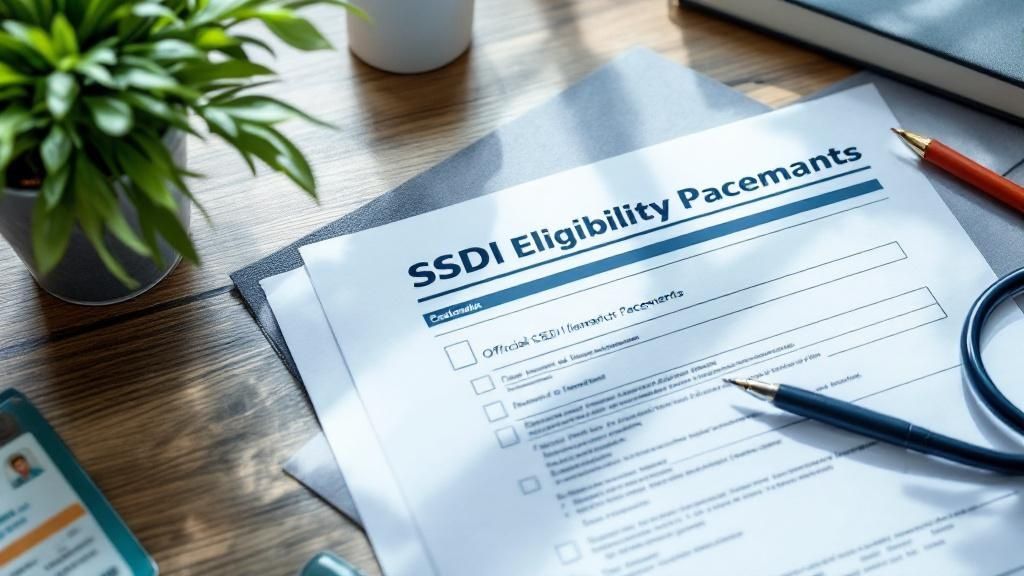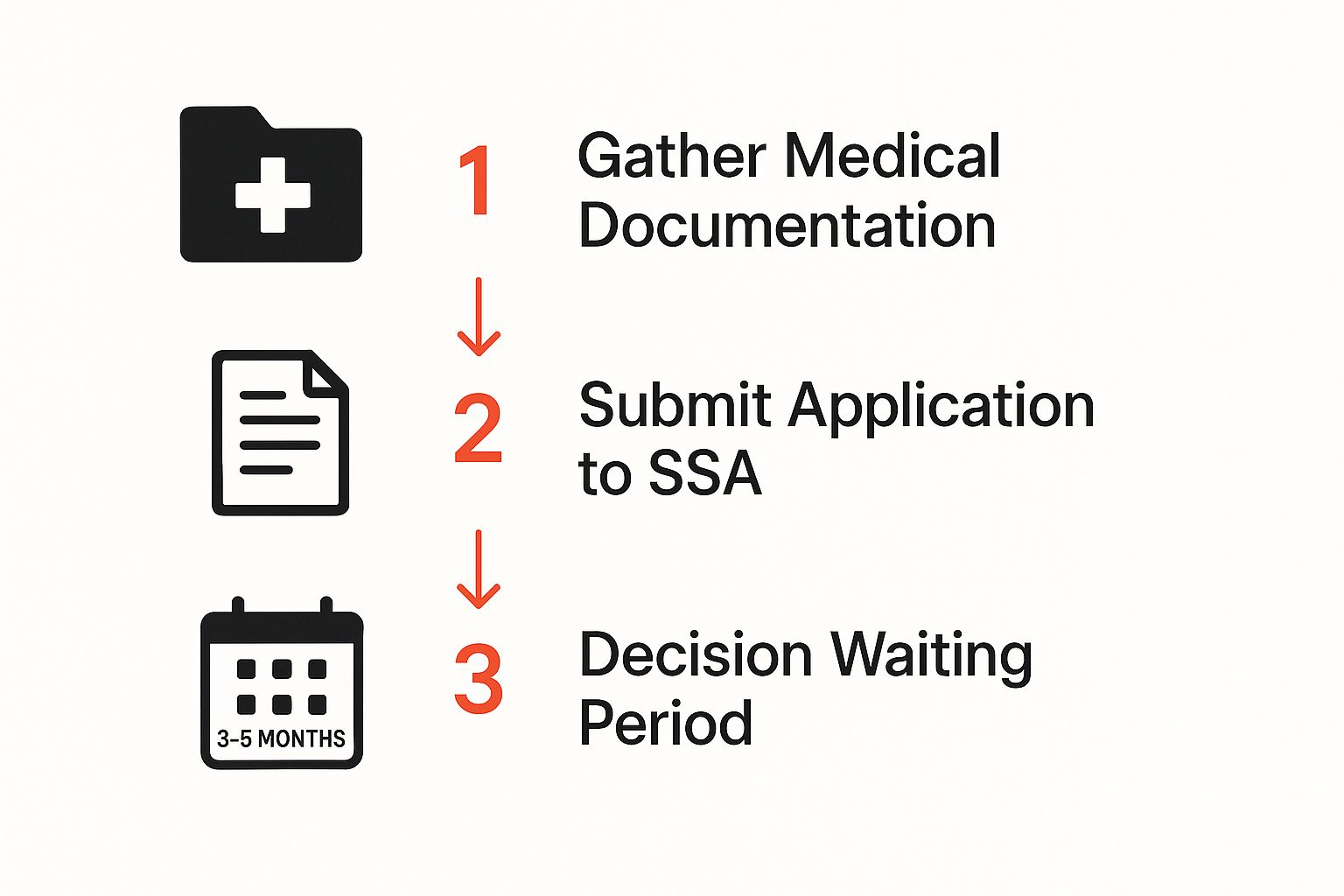Your Guide to Social Security Disability Oregon
"I was satisfied once John Bell took over my case."
"Communication was always timely."
Your Guide to Social Security Disability Oregon
When you're facing a disability that keeps you from working, figuring out how to get Social Security benefits can feel like a monumental task. Here in Oregon, the system has its own quirks, but at its core, it comes down to two main federal programs: Social Security Disability Insurance (SSDI) and Supplemental Security Income (SSI).
Getting a handle on which one you might qualify for is the absolute first step. They sound similar, but they're fundamentally different, and knowing where you stand from the get-go can save you a world of frustration.
Breaking Down SSDI and SSI
Even though the Social Security Administration (SSA) is a federal agency, the actual medical decisions for Oregon residents are handled by a state-level office called Disability Determination Services (DDS). They're the ones who will review your medical records and decide if your condition is severe enough to meet the SSA's standards.
But before your file even gets to them, you need to clear the first hurdle: figuring out if you're applying for SSDI, SSI, or maybe even both.

SSDI: Your Work-Based Safety Net
The easiest way to think about SSDI is as an insurance program. You've paid into it with every FICA tax deduction from your paychecks over the years. Now that you need it, you’re essentially filing a claim on that policy.
To qualify, the SSA looks at your work history, measured in "work credits." You need to have worked long enough—and recently enough—to be considered "insured."
Here's what really sets SSDI apart:
- It’s Earned: Eligibility hinges entirely on your work and tax contribution history.
- No Asset Limits: The amount of money you have in the bank or the value of your home and car doesn't matter for SSDI.
- Pathway to Medicare: After you've been on SSDI for 24 months, you automatically become eligible for Medicare, no matter how old you are.
SSDI is a crucial support system for thousands of Oregonians. In fact, there are about 81,748 SSDI recipients across the state. The average monthly benefit is around $1,510.19, though your specific amount will depend on your lifetime earnings.
SSI: Support Based on Financial Need
Supplemental Security Income, or SSI, is a different animal altogether. It’s not connected to your work history. Instead, SSI is a needs-based program designed to provide a financial floor for disabled, blind, or elderly individuals with very little income and few resources.
The rules for SSI are much stricter on the financial side:
- Strict Financial Caps: Your "countable" resources must be below a certain threshold. For an individual in 2024, that limit is $2,000. The SSA looks at things like cash, bank accounts, stocks, and bonds.
- Work History Isn't a Factor: You can qualify for SSI even if you've never held a job or haven't worked enough to be eligible for SSDI.
- Oregon Health Plan (Medicaid): If you're approved for SSI in Oregon, you automatically qualify for the Oregon Health Plan, which is our state's Medicaid program.
It's actually not uncommon for someone to qualify for both programs at the same time. This usually happens when a person is eligible for SSDI, but their monthly payment is very low. In that case, an SSI payment can be added on top to bring their total monthly income up to the federal standard.
Trying to figure out where you fit in can be confusing. For a deeper dive, I recommend reviewing this guide on how to determine if you are eligible for Social Security Disability benefits.
SSDI vs SSI Key Differences for Oregon Applicants
To make it a bit clearer, let's break down the core differences between these two vital programs. Understanding this table is the first step in knowing which path to pursue.
| Primary Requirement | Based on your work history and FICA tax payments. | Based on financial need (limited income and resources). |
| Work Credits | Required. You must have worked long and recently enough. | Not required. |
| Asset/Resource Limit | No limit on assets like savings, property, or vehicles. | Strict limits. For 2024, it's $2,000 for an individual. |
| Health Insurance | Medicare eligibility after a 24-month waiting period. | Automatic eligibility for the Oregon Health Plan (Medicaid). |
| Source of Funds | Paid from the Social Security trust fund. | Paid from general U.S. Treasury funds. |
Seeing the requirements side-by-side really highlights how different these programs are. Your work history and current financial situation will point you in the right direction, and from there, you can start building your case.
Building a Strong Oregon Disability Application
A winning claim for Social Security Disability isn't just about filling out the forms correctly. It's about building a rock-solid case for yourself, and that process starts long before you ever type your name on an application. Think of it less like paperwork and more like being the lead investigator of your own life—every piece of evidence you gather is another crucial clue.
The truth is, success often hinges on the groundwork you lay beforehand. A strategic approach to collecting the right proof is what makes the Social Security Administration (SSA) take notice.
Gathering Your Core Evidence
Your first mission is to paint a complete picture of your medical condition and, just as importantly, how it tangibly affects your life. It’s not enough to simply have a diagnosis; you need to show the SSA, in black and white, why that diagnosis prevents you from holding a job.
Before you even think about applying, start by systematically pulling together these key documents:
- Your Complete Medical History: This is the big one. We're talking everything—initial diagnostic reports, notes from every specialist, physical therapy records, lab results, and MRI or X-ray reports.
- Contact Information for Providers: Make a comprehensive list of every single doctor, hospital, and clinic you’ve visited for your condition. Include their full addresses, phone numbers, and any patient ID numbers you have. This saves a ton of headaches later.
- A Full Medication List: Document every prescription you're on, including the dosage, when you started taking it, and any side effects you experience. This helps demonstrate the severity of your condition and the treatments you've already tried.
- A Detailed Work History: The SSA will want to know about the jobs you've held over the past 15 years. Compile a list with your job titles, the dates you worked there, and a quick summary of what you did each day.
One of the most powerful tools I’ve seen clients use is a simple daily journal. It doesn’t have to be fancy. Just a notebook where you jot down your symptoms, pain levels, and specific limitations. Noting how your condition impacts everyday tasks like cooking, driving, or even just sitting through a TV show can provide a personal narrative that medical records alone can't capture.
Choosing How to Apply
Once you have your evidence organized and ready to go, you’ve got a few different ways to officially submit your application. There's no single "best" way; it's about what works for you.
- Apply Online: This is the most popular route for a reason. The SSA's online portal lets you save your progress and come back to it later, which is a huge benefit for an application that can be long and draining.
- Apply by Phone: You can call the SSA’s national toll-free number at 1-800-772-1213. An agent will ask you all the questions and fill out the application on your behalf.
- Apply in Person: If you prefer face-to-face help, you can schedule an appointment at your local Oregon SSA office. This is a good option if you have a lot of questions or just feel more comfortable having someone walk you through the forms.
No matter which method you pick, the questions and information needed are identical. The key is having all your documents at your fingertips before you start. It makes the entire process feel much less overwhelming.
Describing Your Limitations on the Key Forms
Pay close attention to the Adult Disability Report (Form SSA-3368). This is arguably one of the most important forms in your entire application. It’s your chance to tell your story in your own words—to explain exactly how your disability impacts your day-to-day life.
This is not the place for vague answers. "I have back pain" won't get you very far.
You need to connect the dots for the examiner. Provide a specific, real-world description of what you can and can't do.
For example, instead of just saying you have back pain, try something like this: "Because of my degenerative disc disease, I can't sit for more than 15-20 minutes without severe pain shooting down my left leg. This makes any kind of desk job impossible. I also can't lift anything over 10 pounds, which prevents me from doing basic things like carrying a bag of groceries, let alone performing my old job as a warehouse stocker."
Apply that level of detail to every limitation you have. You’re translating your medical diagnosis into functional inability—the language the SSA understands. The more clearly you paint this picture, the stronger your case for social security disability in Oregon will be from day one.
The Medical Evidence That Wins Disability Cases
Let's get straight to the point: your medical records are the absolute bedrock of your disability claim. They aren't just supplemental paperwork; they are the core evidence that will make or break your case with the Social Security Administration (SSA) and Oregon's Disability Determination Services (DDS). Without a solid, consistent medical history, even the most genuine claim is likely to be denied.
The entire process boils down to proving you have what the SSA calls a Medically Determinable Impairment (MDI). That's just their official term for a condition that can be backed up by objective medical science—things like lab results, MRI scans, or clinical findings from an examination. In other words, your doctor must be able to diagnose your condition using accepted medical techniques, not just based on how you describe your symptoms.

This is a critical distinction. While your personal experience with pain and limitations is important, the DDS examiner reviewing your file needs to see that experience reflected in concrete medical proof.
How to Talk to Your Doctor
One of the most common pitfalls I see Oregon applicants fall into is assuming their doctor knows what the SSA needs. Your doctor’s job is to treat you, not to build a case for a federal benefits program. It’s up to you to be your own best advocate and guide those conversations to make sure your medical records tell the whole story.
When you see your doctor, try to shift the focus from just your symptoms to how those symptoms impact your ability to function. Get specific. Use real-world examples.
Instead of just saying, "My back pain is getting worse," paint a clearer picture:
- "The pain in my lower back makes it impossible to stand for more than 10 minutes at a time, which is why I couldn't keep my cashier job."
- "My hands get so stiff and swollen in the morning that I can’t button my own shirt or hold a coffee mug safely."
- "The side effects from my medication make it hard to concentrate. I find myself forgetting simple instructions multiple times a day."
This kind of detail gives your doctor the information they need to write descriptive notes that directly address the functional limitations the SSA is looking for.
The Impact of Specialist Reports
While records from your primary care doctor are essential, reports from specialists often carry much more weight with the DDS. Seeing a specialist—a rheumatologist for your arthritis, a cardiologist for a heart condition, or a psychiatrist for depression—signals to the SSA that your condition is severe and requires expert care.
These specialists’ reports usually include more sophisticated diagnostic tests and a deeper analysis of your long-term prognosis. This kind of objective, specialized evidence is precisely what an examiner needs to feel confident in approving a claim for Social Security disability in Oregon.
Here’s a key piece of insight: DDS gives significant weight to the opinions of treating physicians, especially specialists who have been managing your care over time. Consistent, ongoing treatment from a specialist is one of the strongest pieces of evidence you can possibly have.
The "Game-Changer": The Medical Source Statement
If there’s one piece of evidence that can single-handedly turn the tide of a case, it’s the Medical Source Statement (MSS). You might also hear it called a Residual Functional Capacity (RFC) form. This isn't a standard part of your medical file; it’s a specific form your doctor fills out that details your work-related limitations.
An MSS essentially translates your medical diagnosis into the language of disability law. It asks your doctor for their direct medical opinion on questions like:
- How many pounds can you lift and carry on an occasional and frequent basis?
- How many hours in an 8-hour workday can you sit, stand, or walk?
- Are you limited in your ability to reach, handle objects, or use your fingers?
- Is it likely your condition would cause you to miss work or take unscheduled breaks?
This document gets to the heart of the matter: what can you realistically be expected to do in a work environment? A detailed, supportive statement from your doctor, especially when it aligns with the rest of your medical records, can be the deciding factor that gets your claim approved.
What Happens After You File Your Claim?
You’ve submitted your application for Social Security Disability in Oregon. That’s a huge step, but honestly, it’s just the beginning of the road. Now that your claim is in the system, it’s going to move through a few different stages, and it’s a process that can easily take several months. Knowing what's happening behind the scenes can save you a lot of anxiety and help you stay on top of things.

The First Stop: The SSA Field Office
Right after you apply, your claim doesn't immediately go to a medical reviewer. First, it lands at your local Social Security Administration (SSA) field office for a basic technical review.
An employee there is essentially just checking the boxes on the non-medical requirements for SSDI or SSI. They're confirming details like:
- Your age and Social Security number.
- Your recent work history to make sure you have enough "work credits" for SSDI.
- Your current income and assets, ensuring they fall below the strict limits for SSI.
Think of it as a preliminary screening. They aren't looking at your medical diagnosis yet. Once they confirm you meet these basic criteria, your file gets sent on.
The Real Review Begins at DDS
After clearing the initial check, your file is electronically transferred to a state agency called Disability Determination Services (DDS). In Oregon, DDS has offices in Salem and Portland, and this is where the heavy lifting on your claim really happens.
At DDS, your case is assigned to a team—a disability examiner and a medical consultant—who will develop the medical side of your claim. They’ll be the ones requesting all the medical records you listed and digging into the details to see if your condition truly prevents you from working. This is where you can find out more about what conditions qualify for disability benefits.
What if They Need More Information? The Consultative Exam
Sometimes, the records you provided just aren't enough for the examiner to make a clear decision. Maybe they're a bit outdated, or they don't give a complete picture of how your condition limits your daily activities.
When this happens, the DDS will likely schedule you for a Consultative Examination (CE).
The SSA pays for this medical appointment with an independent doctor. I can't stress this enough: you absolutely must go. Missing a CE without a very good reason is one of the quickest ways to get your claim denied.
This doctor isn't there to treat you. Their only job is to evaluate your condition as it stands today and write a detailed report for the DDS. Be prepared to be open and honest about your symptoms and limitations.
The Waiting Game for a Decision
Once the DDS examiner has all the evidence in hand, including any reports from a CE, the team will make a decision on your claim. From start to finish, this initial determination process typically takes between 3 to 6 months here in Oregon. It’s a long time to wait, I know.
Eventually, you'll receive a decision letter in the mail. It's important to remember you're not alone in this process. In Oregon, tens of thousands of residents rely on these benefits. The system supports over 55,855 disabled workers plus their families, with hundreds of millions of dollars in benefits paid out annually. Each step is crucial to ensuring you get the support you need.
How to Handle a Denial and Appeal Your Case
It’s easy to feel like your world is ending when you get that denial letter for your Social Security Disability claim. Take a deep breath. For countless Oregonians, this is a frustrating but completely normal part of the process. Most initial applications are denied, so this isn't the end of the road—it’s just the signal that the real fight is about to begin.
The most important thing to burn into your memory right now is the 60-day deadline. You have exactly 60 days from the date on your denial letter to file an appeal. If you miss that window, you’ll likely have to start the entire application from scratch, which could mean losing out on months, or even years, of potential back pay. You have to act fast.
The First Step: Reconsideration
The first level of appeal is called Reconsideration. What you're doing is asking a new examiner and medical consultant within Oregon’s Disability Determination Services (DDS) to give your file a fresh look.
To be blunt, the odds of winning at this stage are not great. While you don't have to submit new evidence, this is the perfect time to add any recent medical records you've gathered since you first applied. Think of this step as a necessary hurdle and a chance to make your case file even stronger for the more critical stages ahead.
Don't get discouraged if the Reconsideration is also a denial. It happens all the time. Your best chance of winning your case is usually at the next level: the hearing with an Administrative Law Judge.
The Hearing Before an Administrative Law Judge
If your Reconsideration is denied, you then request a hearing with an Administrative Law Judge (ALJ). This is a game-changer. For the very first time, you get to appear (either in person or by video) and explain your story directly to the individual making the final call.
The ALJ hearing is where the vast majority of denied claims finally get approved. The judge is a federal employee, not part of the state DDS agency, which means they have more leeway to look at the human side of your situation, not just the raw data in your file. This is your chance to show them you're a person, not a case number.

Preparing to Win Your ALJ Hearing
Your success at the hearing comes down to one thing: preparation. The time between requesting the hearing and the actual date—which can be many months—is your opportunity to build an ironclad case.
Here’s where to put your energy:
- Keep Gathering Medical Evidence: Don't stop going to your doctor. You need updated records, reports from specialists, and any new test results. The judge is required to look at every piece of evidence right up until the day of your hearing.
- Get a Medical Source Statement: This is huge. If you haven't done it yet, ask your primary doctor to fill out a detailed form that spells out your specific functional limitations. A strong, supportive statement from a treating physician can be incredibly persuasive for an ALJ.
- Practice Your Testimony: You'll be under oath, answering questions about your condition, your past jobs, and what you can (and can't) do in a typical day. It's vital to practice explaining how your condition prevents you from working, using clear, real-world examples.
Getting this right is complicated, and knowing how to present your case effectively makes all the difference. For a deeper dive into strategy, you can find more in our complete guide on how to appeal a disability denial.
You can also expect a Vocational Expert (VE) to be at the hearing. The SSA hires this person to listen to your testimony and give their expert opinion on whether jobs exist that someone with your exact limitations could still do. A skilled attorney's ability to cross-examine this expert is often a pivotal moment in the hearing.
Beyond the ALJ Hearing
If the ALJ denies your claim, there are still two more levels of appeal: the Appeals Council and then Federal Court. Frankly, these stages are less common and are more about finding legal or procedural mistakes made during the hearing, rather than just re-arguing your medical facts.
The entire appeals process is a marathon, not a sprint. To help you keep track of what comes next, here is a quick overview of the different stages.
The Four Levels of Social Security Disability Appeals
Understanding the sequential stages of the appeals process if your initial claim is denied.
| Reconsideration | A new reviewer at the state Disability Determination Services (DDS) office looks at your file. | Get a fresh set of eyes on the initial evidence and add any new medical records. |
| ALJ Hearing | You appear before an Administrative Law Judge to testify about your condition and limitations. | Present your case in person, offer testimony, and have an attorney cross-examine witnesses. |
| Appeals Council | A review board examines the ALJ's decision to see if a legal or procedural error was made. | Show that the judge made a mistake in applying the law or overlooked important evidence. |
| Federal Court | You file a civil lawsuit against the Social Security Administration in U.S. District Court. | Argue that the SSA's final decision was not supported by the evidence or was legally incorrect. |
As you can see, the path can be long and complex. Navigating this journey is a marathon, and the financial and emotional strain is very real. This is precisely why programs like SSI are so vital. In Oregon, there are approximately 81,423 residents receiving Supplemental Security Income. For those who qualify, the average monthly payment of about $682.85 provides a crucial lifeline while they navigate their health challenges. Each step of your appeal is another chance to prove you deserve to be one of them.
Common Questions About Oregon Disability Benefits
When you're trying to get Social Security Disability benefits in Oregon, questions are bound to pop up. The whole process can feel like a maze, and everyone's journey is a little different. Let's tackle some of the most frequent questions we hear from folks here in Oregon.
How Much Does a Disability Lawyer Cost in Oregon?
This is usually the first thing people ask, and for good reason. When you can't work, the last thing you need is another bill. The good news is that the system is built to protect you from out-of-pocket costs.
Social Security disability attorneys in Oregon work on what’s called a contingency fee basis. In simple terms, this means you don't pay them a dime unless they win your case.
Federal law keeps a tight rein on how they get paid. If you win, your lawyer receives a portion of the "back pay" you're awarded—that's the money that built up while you were waiting for the SSA to approve your claim. The fee is set at 25% of your back pay, but it's also capped at a maximum amount.
The bottom line is simple: if you don’t win and get back pay, you owe your attorney zero. It’s a risk-free way to get an expert in your corner when it matters most.
How Long Is the Wait for a Disability Hearing in Oregon?
If there's one thing you need during this process, it's patience, especially if your case goes to a hearing. Once you request a hearing before an Administrative Law Judge (ALJ), the waiting game begins, and the timeline can be unpredictable.
Here in Oregon, the average wait from the day you ask for a hearing until you're actually in the courtroom can range from several months to well over a year. A lot of it comes down to the backlog at the state's two main hearing offices:
- The Portland Hearing Office
- The Eugene Hearing Office
While you're waiting, the most important thing you can do is stick with your medical treatments. Make sure to let your lawyer know about any changes in your health, new doctor visits, or different medications. That way, when your hearing day finally comes, your file is packed with the strongest, most up-to-date evidence.
Can I Work While Applying for Disability in Oregon?
Yes, you can work while your application is pending, but you have to be extremely careful. The Social Security Administration has very strict rules about how much you can earn, and they use a benchmark called Substantial Gainful Activity (SGA).
For 2025, the SGA limit for non-blind individuals is $1,620 per month. If your gross earnings go over that amount, the SSA will almost always deny your claim, concluding you aren't disabled by their definition—no matter what your medical records say.
There are some complex exceptions, like "unsuccessful work attempts," for when you try to go back to work but your disability forces you to stop. These rules are tricky to navigate. That's why it's absolutely crucial to report every penny you earn to the SSA and talk it over with your attorney. Going even a little over the SGA limit can sink your entire claim for social security disability oregon.
At Bell Law, we've seen firsthand the physical, emotional, and financial strain a disability can cause. Our Oregon attorneys are here to walk you through every step of the Social Security Disability process, from that initial application to representing you in front of a judge. If you're overwhelmed and struggling to get the benefits you need, contact us for a consultation.
Disclaimer: The information on this page is provided for general informational purposes only and is not legal advice. Reading this content does not create an attorney-client relationship. For advice about your specific situation, please contact a licensed attorney.







